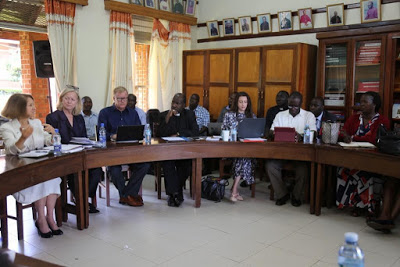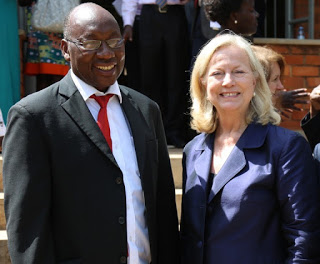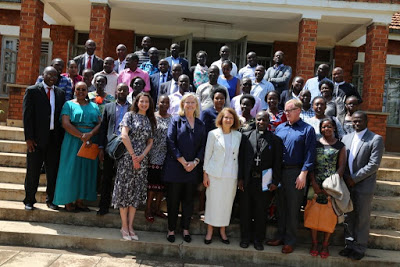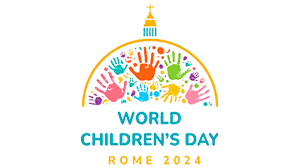UGANDA: PEPFAR Meets Faith Based Organizations to Galvanize Efforts Against HIV/AIDS

A section of PEPFAR representatives with Bishop Muhiirwa
In an effort to provide an opportunity to strengthen relationships and forge new partnerships in response to the global HIV/AIDS crisis, on 23rd October 2018, the Uganda Catholic Medical Bureau (UCMB) in collaboration with the United States President’s Emergency Plan for AIDS Relief (PEPFAR) hosted a consultative meeting at the Uganda Catholic Secretariat premises.

and the UCMB Executive Director, Dr. Sam Orach
(left) after the meeting
The meeting explored opportunities for religious leaders and health service providers from different religious denominations to promote universal access to HIV prevention, treatment, care and support in their communities, and to speak out against stigma and discrimination affecting the people living with HIV/AIDS. Partners examined how the longstanding experience of faith-based organizations in responding to HIV/AIDS can alleviate the human suffering caused by the pandemic and how to prevent it from further spreading in the country.
The consultative meeting brought together participants from various faith communities including the Catholic, Anglican, Orthodox, Seventh Day Adventists and Muslim religious groups. Also present was the Chairman of the Health Commission and HIV/AIDS of the Uganda Episcopal Conference. Rt. Rev. Robert Muhiirwa, leaders and representatives of networks of people living with HIV, and other organizations active in the response to HIV across the country.
Speaking at the meeting, the Chief Strategy Officer of PEPFAR, Sandra Thurman, said that many faith-based health service providers are joining other actors in the global fight against the devastating pandemic so much that they are offering PEPFAR some specific resources and strength.
“We are really thrilled to be here to consult with both our Catholic partners and other faith based partners who have been engaged too in HIV/AIDS programs in Uganda. Today, we are looking for ways to better our partnership with the existing faith based institutions and to network with new partners that we haven’t worked with us before so that we can all reach out to those who really need information about HIV to keep themselves safe from getting the disease,” she said.
“We are consulting with these groups because they have incredible information and experience which will help us to create better programs that will respond to the needs of Ugandans in the urban, semi-urban and rural areas, which have different needs regarding HIV and health education,” she added.
During the meeting, participants addressed the realities of how stigma and discrimination are perpetuated both in religious communities and society at large. They identified best practices to strengthen the voice and action of religious leaders and bring about collaboration among different faiths and with other sectors that are involved in the response to HIV/AIDS. PEPFAR renewed its commitment to not only maintain but rather increase support in the fight to eradicate HIV/AIDS as a public health threat.

Uganda Episcopal Conference. Rt. Rev. Robert Muhiirwa pose
for group photo with the participants
The UCMB Executive Director, Dr. Sam Orach, said faith based organizations have the ability to inspire and empower change within their own communities, across countries, and throughout wider communities, hence it is important to engage them in such matters.
“It is true that HIV has been controlled to a big extent. However, we have reached a point where the last part of the mountain has become much more difficult to climb. At this point, we ask ourselves which gear to engage. And this is when you need to engage the stronger lower gear. Therefore, the purpose of this meeting, is to engage the lower gears, which are the faith based institutions so as to galvanize our efforts against a disease that continues to spread,” he explained.
Since the beginning of the HIV epidemic, religious communities, mosques, temples, churches, hospitals and clinics have reached out to provide support to those living with and affected by HIV. Strengthening their leadership can greatly influence the lives of many people, and leaders speaking out responsibly about AIDS can make a powerful impact at both community and international level.
∽End∽
By Jacinta W. Odongo, Media Officer, Uganda Episcopal Conference


